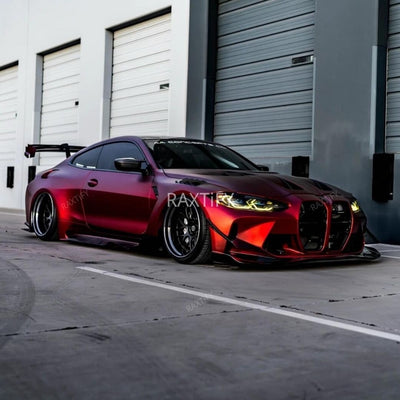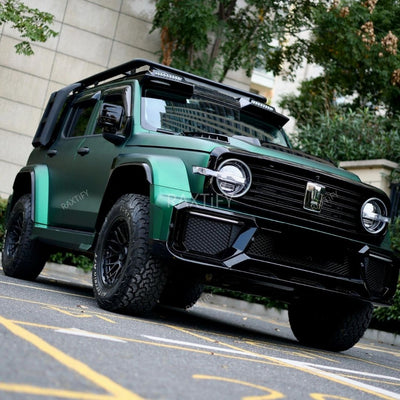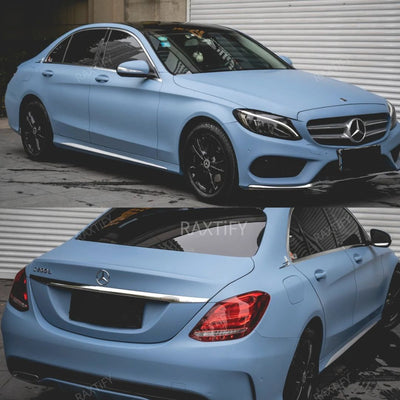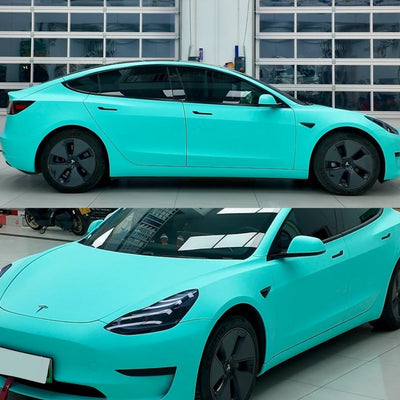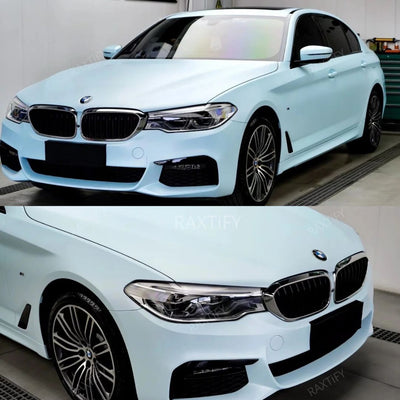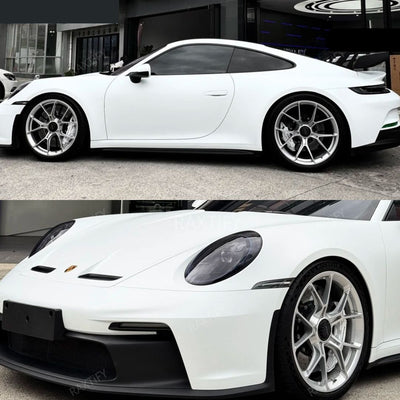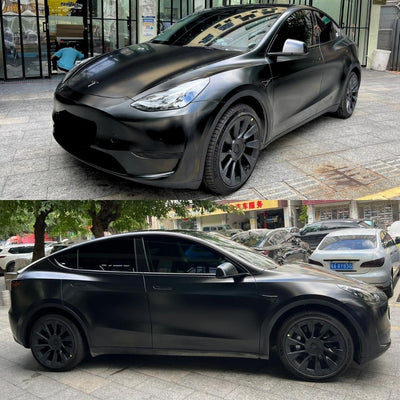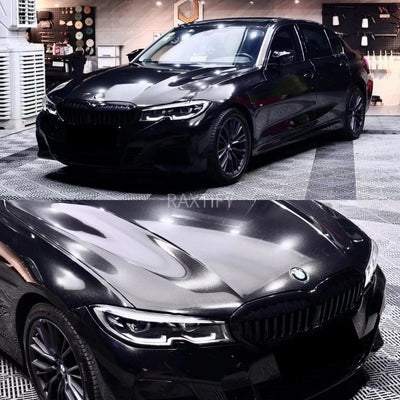
MAKING THE RIGHT CHOICE FOR YOUR CAR
When it comes to safeguarding and enhancing the appearance of your car, SUV, or truck, you have options. Yet, finding a solution that not only shields your vehicle's surface but also adds flair and advertises your brand can be a challenge. Enter the car wrap. While car wraps have been in existence for a while, many vehicle owners wonder: does a car wrap harm paint?
The reality is that a vinyl wrap, also known as a car wrap, poses no threat to any paint type – be it glossy or matte. Crafted from ultra-thin vinyl materials, a car wrap stands as one of the most versatile paint protection solutions available.
Businesses utilize car wraps to promote their services to local clientele, while individuals often choose vinyl wraps for their aesthetic appeal or decorative purposes. Moreover, there are numerous advantages to applying a car wrap to your everyday vehicle. Let's delve into some of the key inquiries surrounding vehicle wraps, empowering you to make a well-informed decision.
What Are Car Wraps Made From?
Car wraps, commonly known as vinyl wraps, are primarily constructed from Poly Vinyl Chloride (PVC) material. This material is enhanced with plasticizers to provide flexibility and pigments to achieve the desired appearance. These components contribute to the overall aesthetic and durability of the wrap.
In addition to PVC, car wraps include ancillary ingredients to ensure protection for the underlying surface. Heat stabilizers and UV absorbers are incorporated to shield the vehicle's paint from UV exposure, enhancing the longevity of the wrap. Once applied and bonded to the surface, whether it be car paint, plastic trim, or moldings, the wrap becomes weather resistant.
Another important material used in car wraps is cast vinyl. This manufacturing process involves placing all ingredients into a mold and baking them to create a flexible and shrink-resistant wrap. Cast vinyl wraps offer enhanced durability and longevity compared to traditional vinyl wraps.
Overall, car wraps are composed of a combination of PVC material, plasticizers, pigments, heat stabilizers, and UV absorbers, providing both aesthetic appeal and protective qualities to vehicles.
When should you consider wrapping your car?
Applying a vinyl wrap to your car is a versatile option that can enhance its appearance and protect its surface. Here are some scenarios where wrapping a car is recommended:
-
Concealing paint damage: Many car owners opt for a vinyl wrap to hide paint imperfections or to change the vehicle's color. However, the smoothness of the base surface plays a crucial role in determining the quality of adhesion.
-
Enhancing visual appeal: Vinyl wraps are perfect for customizing the color or graphics on your vehicle. You can personalize the design with specific colors, patterns, branding, or other enhancements, either on a single sheet or with multiple layers of individual designs.
-
Advertising purposes: Businesses, both large and small, use car wraps to brand and advertise their company on city roads, highways, or wherever the vehicle is parked. Customized wraps can fit any vehicle size and feature die-cut designs that match the brand, offering an affordable advertising platform.
-
Motorsports applications: Whether you're a rally racer or drive a high-speed Nitro Funny Car, a vinyl wrap offers a cost-effective solution to achieve a custom appearance akin to a high-priced paint job. Sponsors appreciate the quality display of their logos, and a vinyl wrap provides added protection, especially for off-road racing vehicles.
Is it necessary to fix the car's paint before installing a car wrap?
It's often believed that a car wrap can hide paint damage, but that's not entirely accurate. For vinyl to adhere properly, the surface must be smooth and clean. Following a proven prep method is essential for quality results.
Start with a thorough decontamination car wash to remove old wax, grease, and surface contaminants.
-
Clay Bar Treatment: To ensure optimal bonding, consider a clay bar or clay mitt treatment. This will eliminate tiny imperfections trapped in the clear coat, such as brake dust, pollen, and other particles. It also tackles stains from bird droppings, bug splatters, and tree sap.
-
Paint Correction: This step is up for debate. Some detailers and vinyl installers argue against completing paint correction (which involves polishing scratches or imperfections from the clear coat), while others insist it's beneficial.
Before committing to a vinyl wrap, consult with several professional installers to weigh the pros and cons and make an informed decision. Ensuring the paint's condition is suitable beforehand will lead to a successful vinyl wrap installation.
What Types of Vinyl Wrap Designs Are Available?
When it comes to vehicle wrap designs, the options are virtually endless. From custom graphics to color changes, patterns, logos, and more, the possibilities are vast.
You can enhance your vehicle's appearance with individual vinyl decals, adding a personalized touch to your ride. Additionally, partial wraps are an option, allowing you to apply vinyl material to specific areas of the original paint.
Vehicle wrapping offers unparalleled flexibility and affordability, making it the ideal choice for transforming the look of your vehicle. Whether you're looking for a bold statement or a subtle upgrade, vinyl wraps provide a versatile solution to suit your style.
How Much Does a Car Wrap Cost?
Similar to other automotive protective coatings, the durability of a vinyl car wrap hinges on various factors. A primary factor is its exposure to UV rays, particularly direct sunlight. Although modern vinyl incorporates UV-resistant components, prolonged exposure can still lead to deterioration over time.
Additionally, outdoor elements such as the following can impact the lifespan of a car wrap:
-
Cold and snow exposure: Vinyl materials may not fare well in cold weather. While they can withstand occasional exposure to snow and below-freezing temperatures, continuous exposure may accelerate wear and tear.
-
Hot weather and sandstorms: Vinyl materials are susceptible to damage in desert and hotter climates. Blowing sand can also cause minor imperfections and pitting on the surface of the car wrap.
-
Heavy rain: While vinyl wraps are water-resistant, they are not entirely waterproof. Individuals residing in tropical or wet climates should take measures to minimize continual exposure to rain.
Ensuring proper maintenance and protection against these outdoor elements can help prolong the lifespan of a car wrap.
How Much Does a Car Wrap Cost?
Car wraps offer a cost-effective way to enhance the appearance of your vehicle without investing in a new paint job. However, before deciding on a vinyl wrap, it's important to consider the associated expenses.
For a complete vehicle wrap, you can expect to invest a minimum of $3,000. Certain chrome car wraps may cost as much as $10,000, especially for larger vehicles like pick-up trucks or full-size SUVs. The price of the wrap depends on several factors, including the type of material used, the extent of prep work required, customization options, and the labor involved in the application process.
The complexity of the vehicle also impacts the cost. Two-door sports cars, for instance, typically have less surface area compared to full-sized sedans, making them easier and less expensive to wrap. However, challenges arise with door panels, as the vinyl material must be meticulously fitted to ensure a smooth finish. Additionally, it's important to budget for any necessary paint corrections or repairs before applying the vinyl wrap.
Deconstructing the Benefits of Car Wraps
Transforming the appearance of your vehicle – whether it's a car, truck, SUV, motorcycle, or racecar – is easily achievable with a vinyl wrap. Unlike traditional repainting, vinyl wraps offer a cost-effective solution that allows for a change in style without breaking the bank.
While weighing the advantages and disadvantages, it's crucial to ensure that the vinyl wrap you select meets your aesthetic preferences and fits within your budget constraints.
Increasingly, car owners are opting to enhance their vinyl wraps with a nano ceramic coating. This additional layer provides numerous benefits, such as repelling water, simplifying cleaning and maintenance routines, and enhancing the visual depth of the wrap.
If you're contemplating a car wrap and seeking expert advice, consider reaching out to a local auto salon specializing in advanced paint protection solutions. From PPF to ceramic coating and car wraps, they can guide you in achieving the desired outcome for your vehicle.







